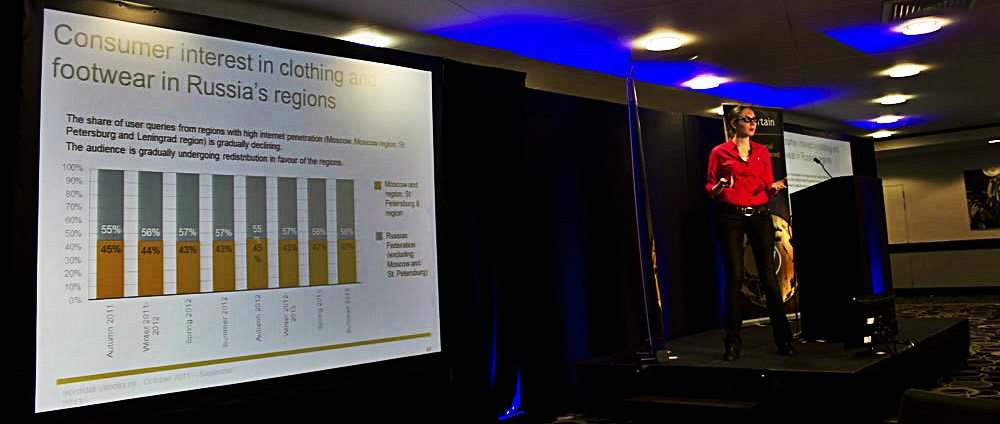 From geotargeting to international keyword research (and everything in between), this week’s International Search Summit in London turned out to be yet another event chock-full of useful tips, tricks and tactics for global digital marketers.
From geotargeting to international keyword research (and everything in between), this week’s International Search Summit in London turned out to be yet another event chock-full of useful tips, tricks and tactics for global digital marketers.
In case you missed it, here are 21 takeaways from the event.
Managing search in a global enterprise – David Carralon, British Council
- Local domains’ (ccTLDs’) hugely positive impact on link building
One of the biggest SEO decisions prior to rolling out a global web presence is whether to adopt a ccTLD (e.g. yourdomain.es), subdomain (es.yourdomain.com) or subdirectory (e.g. yourdomain.com/es) structure – or a combination of these. Being in the midst of a large scale global website rollout for the British Council, David has made a strong push for using ccTLDs. While there were several underlying reasons for recommending this in the strategic phase ahead of rollout, evidence existed that the only two country websites in the overall British Council network running under ccTLDs (e.g. britishcouncil.de) had garnered up 600% more backlinks than comparable websites placed in subfolders (e.g. britishcouncil.org/it/italy).
- Local domains’ (ccTLDs’) hugely positive impact on link building
Hreflang and geotargeting – Gary Illyes, Google
- Do not auto-redirect your website visitors based on IP location
When you have put in the time and effort to make your site multilingual, you of course want your visitors to end up on the localised version that is right for them (if any such site is available, of course). There is the right way of going about this, and then there is the wrong. Gary used Amazon as an example of a site that handles the process well. Instead of forcing users to a certain destination based on their location, Amazon detects the user’s location and brings to their attention that a local site is available that might be more relevant. Doing so is not only good from a user experience POV, it also allows search engine spiders (which are typically crawling from the US) to crawl all of your localised versions, as they are not automatically redirected to the US page.
- Do not auto-redirect your website visitors based on IP location
- Get your hreflang-rel-alternate markup right – common mistakes
Two-way annotation
Hreflang is a bidirectional annotation. In plain English, this essentially means that your backlinks need to go both ways (e.g. page A needs to reference page B, and page B needs to reference page A, etc.) in order for Google to recognise and interpret your hreflang deployment. A missing backlink will break the cluster, in which case Google will ignore the annotations – so be sure to check for this.Select correct country codes:
Obvious right? Well, according to Gary, the use of weird/wrong country codes is one of the most common mistakes webmasters make when implementing the hreflang annotations. To prove his point, Gary provided a few examples; one of a website that wanted to target Spanish-speakers in Los Angeles but effectively ended up targeting Spanish-speakers in Laos by using the “la” abbreviation, as well as the more common “en-uk” for English-speakers in the United Kingdom. This annotation, however, will see webmasters targeting English speakers in Ukraine (uk) and not the United Kingdom for which the country code is “gb”.So in short, get your markup right or you might just find yourself in a much bigger mess than you initially were.
- Get your hreflang-rel-alternate markup right – common mistakes
Targeting the remote customer globally – Andy Atkins-Krueger, Webcertain
- Research first, foremost, forever
There are many reasons as to why research is hugely important for international digital marketers. For one, customers across different geos speak different languages, have different cultural frameworks, purchasing styles, motivations, needs etc. – and these differences must necessarily be thoroughly understood in order for businesses to choose the right markets as well as succeeding when reaching your new destinations. Secondly, as digital marketers we are really on remote control; in other words, we cannot observe the customer in nearly the same way a physical shop owner can, and this increases the need for research. Geert Hofstede’s cultural dimensions can be helpful in establishing differences between countries.
- Research first, foremost, forever
Global PPC and SEO: A tale of two channels – Johann Godey, Vistaprint
- Do NOT have your SEO and paid search teams work in silos…
…or worse even, compete against each other. When properly managed and integrated, SEO and PPC not only complement each other, they can significantly improve your CTR for both your paid and organic listings. (Johann used Google’s “Search Ads Pause Study“, which showed that a full 89% of the traffic generated by search ads is not replaced by organic clicks when ads are paused, as well as Vistaprint’s own data based on more than 67 million impressions to show that having both paid and organic listings in SERPs can improve performance of both channels).
- Do NOT have your SEO and paid search teams work in silos…
- Analyse impact across countries and compare
Johann, however, did not seem to suggest that synergies always exist between organic and paid (i.e. in some cases cannibalisation might occur, where paid listings “steal” clicks that would otherwise have gone to organic). Additionally, the impact of having both organic and paid listings might differ substantially between countries, so have solid analytics in place that allows you to benchmark cross-country performances. Then rinse and repeat.
- Analyse impact across countries and compare
International keyword research uncovered – Benjamin Lefebvre, Webcertain

- Do not translate your keywords!
It will not work as keywords depend mainly on the culture the internet user is part of. While conducting keyword research for the same product across several market, do not expect to have the same but make the most of the differences to understand what your target audience is really looking for! It will help you understand the market but will give you room to adapt your website if necessary and lead you to local success!
- Do not translate your keywords!
- Only few companies transliterate their brand and their product names…
… and this is how they open the door to local SERPs for other companies, dealers and online non-official shops. Since a lot of online markets do not use Latin characters in their native language, they tend to hear your brand and type it in their own character settings. If your website does not appear in SERPs for your own brand, others will do and might get the business instead of you! Think the other way round: would you type a Korean brand in Latin characters? When searching for Samsung, do you type 삼성?
- Only few companies transliterate their brand and their product names…
- Search engines are not all the same…
…and once you understand this, you will start to make the most of their unique features. Google is great for English but (let’s face it) it is not as amazing for Russian, for example. However, Yandex is very advanced for Russian as it has been developed specifically for the Russian market and the needs and demands of users in this territory. You will observe differences between a search engine to another depending on what language and market you are targeting. Ignoring those differences will lead you to failure.
- Search engines are not all the same…
Yandex and Russia – Tatiana Kalinina, Yandex
- Heavy dominance in Russian online ad market
Advertiser interest in Yandex continues to grow steadily as the Russian search leader (62% market share) continues to keep almighty Google (27% market share) at bay in its home market. Yandex now has 460000 advertisers and takes home more than half of total spend on online advertising in what is Europe’s largest internet market by user count. For contextual advertising (i.e. search ads) its share is as high as 68%.
- Heavy dominance in Russian online ad market
- Yandex.Market most popular shopping comparison platform in Russia
With more than 17 million visitors per month and accounting for 13% of all online sales, Yandex.Market is the leading shopping comparison platform in Russia. Much of the platform’s popularity is down to the fact that it largely has managed to eliminate the trust barrier, a prevalent issue which has historically deterred many Russian internet users from purchasing goods online. What is more, Yandex.Market results are integrated into Yandex universal search results, potentially providing online retailers with a great deal of exposure for their products.
- Yandex.Market most popular shopping comparison platform in Russia
Global search engine headlines – Gemma Birch, Webcertain
- The battle for mobile supremacy in China
Mobile is becoming increasingly important in China. Baidu is heavily investing in mobile – from app stores (91 Wireless) to mobile payment systems (Baidu Wallet) – and Alibaba has just launched a new search engine specifically for mobile (Shenma). If you are targeting China, you MUST provide a good mobile user experience, or you will undoubtedly lose visitors and potential customers.
- The battle for mobile supremacy in China
- Global search engines turned content marketers
From Yandex.Maps exploring the Arctic to Baidu visualising the Chinese New Year migration to finding your car with Google Now, content marketing is important even for the search engines. They are increasingly creating features and content which does not serve a major search function, but will attract and resonate with users – and therefore develop or strengthen brand loyalty and increase awareness.
- Global search engines turned content marketers
How to manage and set up international content marketing – A 7-step framework – Marcin Chirowski, Englishtown
- Listening is an essential part of any successful content marketing strategy
In order to pull it off on an international scale you should combine listening tools with local know-how (i.e. have natives manage the listening tools or alternatively have them validate your findings).
- Listening is an essential part of any successful content marketing strategy
- Some of the better free conversation tools count…
…Icerocket and Buzzsumo. The former offers blog, Twitter and Facebook monitoring in 20 languages. The latter is great for spotting trends and analyse what content performs best for any topic or competitor.
- Some of the better free conversation tools count…
- Create a persona for each of your target markets…
…and have your persona mapped to the buying cycle. It is imperative to ensure close collaboration with local teams when building your persona types in order to accurately identify and understand more deeply rooted motivations, needs, goals and struggles of your audience in each locale.
- Create a persona for each of your target markets…
SEO-localisation: Managing international content – Emily MacKenzie, Webcertain
- Efficient and cost-effective
The combined workflow of SEO-Localisation is an efficient way of both translating and optimising content for your international sites. In the long run it will prove more cost-effective so that you can spend more of your available time and budget on link building and social activities.
- Efficient and cost-effective
- Dramatic results
By implementing this workflow you will be able to monitor the results from the moment you launch your site. The number of global visitors, leads and conversions generated by your multilingual sites will continue to grow over time but, if implemented properly, SEO-Localisation can dramatically improve the performance of your new international website from the get go.
- Dramatic results
Maximising global opportunities – Immanuel Simonsen, Webcertain
- 1 in 4 internet users globally are now Chinese
With a whopping 618 million internet users, China’s internet population is 2.5 times the size of the US’ in second place and has reached a level where 1 in every 4 people online are Chinese. What is perhaps even more staggering is the fact that, with less than half of the overall population having access to the internet, the online landscape continues to grow like gangbusters. In 2013 alone, China added more internet users (55m) than the entire online population of France, the world’s 10th biggest internet market.
- 1 in 4 internet users globally are now Chinese
- Watch the MINT!
Yes, China’s scale is unique and, quite frankly, insane. A whole bunch of other fast-growing markets, however, also require attention from marketers on the lookout for growth opportunities. Well, the MINT countries – a new catchy acronym from the guy who gave us the BRIC – might be a good place to start. The MINTs, which is short for Mexico, Indonesia, Nigeria and Turkey, are viewed as some of the most promising emerging economies.
- Watch the MINT!
- The shift is starting to show in cool cash
Many emerging markets are quickly evolving from merely having large internet populations to having large populations with significant purchasing power. eMarketer expects the Asia-Pacific region ($501 billion) to overtake North America ($469 billion) this year by B2C ecommerce sales value – marking a first ever – as exponential growth rates show little to no signs of slowing down.
- The shift is starting to show in cool cash












